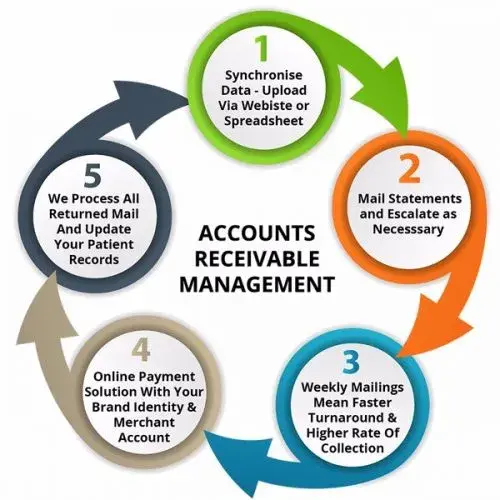What Is the Accounts Receivable Process?
Rayvat Accounting is an outsourcing accounts receivable firm that can help companies by easing accounts receivable management. Partnering with the firm can provide companies with access to manpower and resources which will help in the collection of outstanding payments.
The firm offers virtual bookkeeping services, cash flow management, and payable services, as well as access to online accounting reports. It also sends out weekly reports of their follow-up with customers of partner companies including analysis and metrics on the outstanding debt.

What is Accounts Receivable Management?
Accounts Receivable Management involves overseeing and optimizing the collection of outstanding invoices from customers. It includes strategies to ensure timely payments, minimize overdue accounts, and maintain healthy cash flow. Effective management practices include credit assessment, invoicing, monitoring payment terms, and following up on overdue payments. This process is crucial for maintaining financial stability, reducing bad debt, and improving customer relationships. By efficiently managing accounts receivable, businesses can ensure they have the necessary cash on hand to meet their obligations and invest in growth opportunities.Key Benefits of Accounts Receivable
-
Accounts receivable is an asset account on the balance sheet that represents money due to a company in the short term.
-
Accounts receivables are created when a company lets a buyer purchase their goods or services on credit.
-
Accounts payable is similar to accounts receivable, but instead of money to be received, it’s money owed.
-
The strength of a company’s AR can be analyzed with the accounts receivable turnover ratio or days sales outstanding.
-
A turnover ratio analysis can be completed to expect when the AR will be received.
Difference Between Accounts Receivables vs. Accounts Payable
When a company owes debts to its suppliers or other parties, these are accounts payable. Accounts payable are the opposite of accounts receivable. To illustrate, imagine Company A cleaning Company B's carpets and sending a bill for the services. Company B owes them money, so it records the invoice in its accounts payable column. Company A is waiting to receive the money, so it records the bill in its accounts receivable column.
Benefits of Accounts Receivable Services by Rayvat Accounting:
-
Better cash flow management for the business
-
Reduction in Bad Debts
-
Owners can focus on their business
-
Increase receivable management efficiency
-
Reduce administrative costs
-
Minimize credit risk
-
Decreased overhead costs
-
Saved time
-
Reduced human error
Fill Out the Form With the Required Details To Get In Touch With Us.


